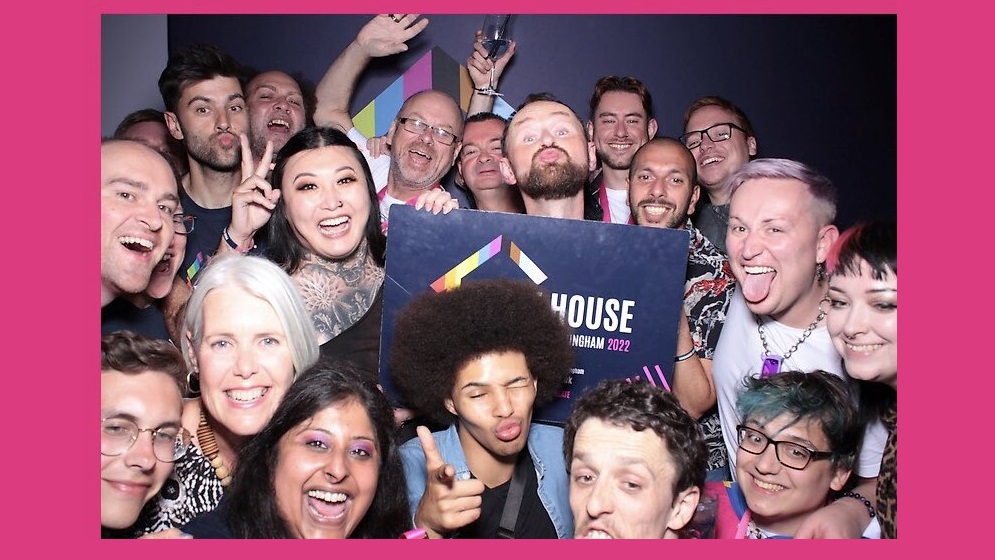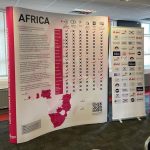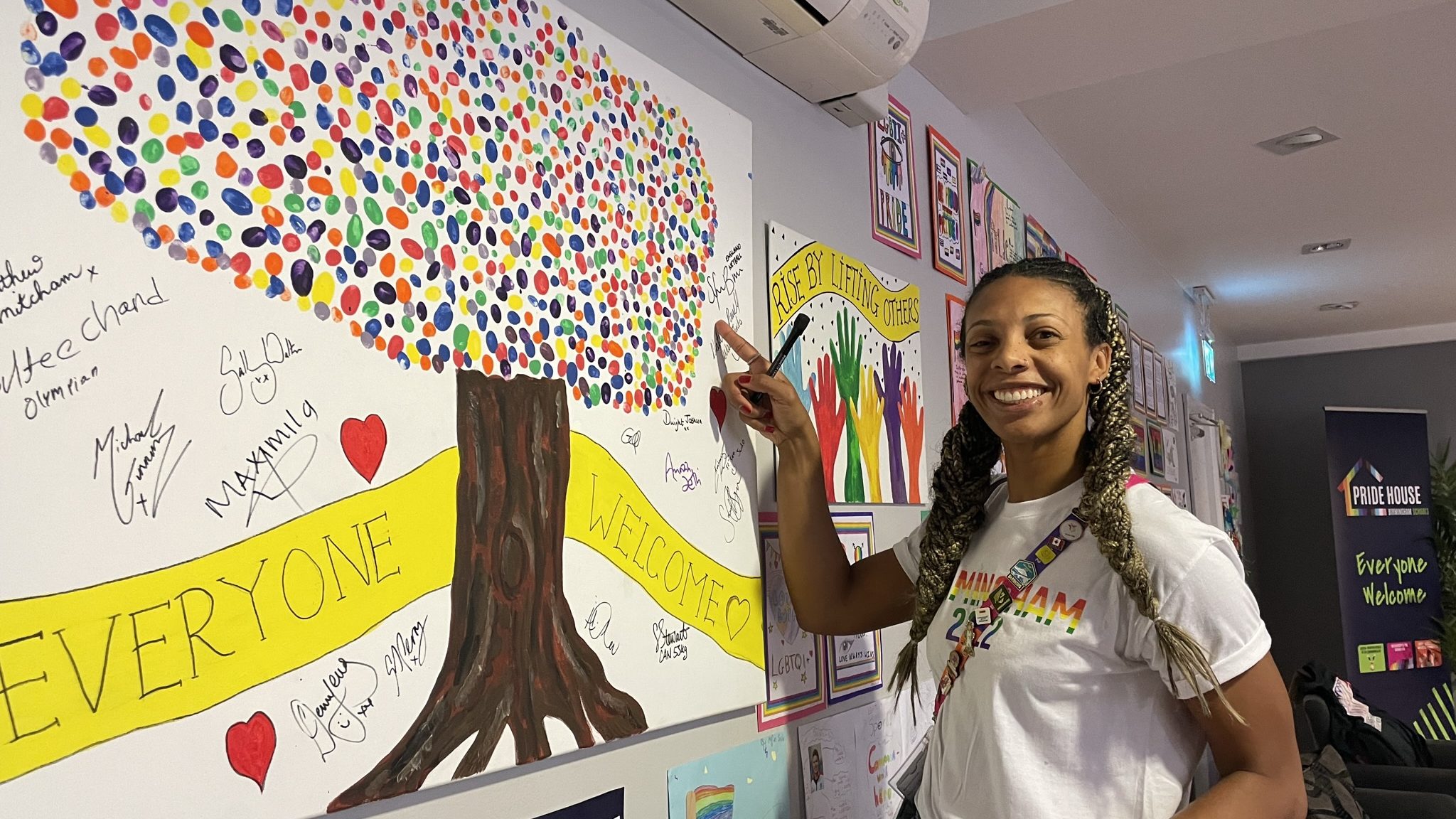‘Build on the buzz in Brum!’ What did we learn from Pride House Birmingham?

Birmingham 2022 left many memories but what matters most is harnessing the energy and excitement generated by the Commonwealth Games – and that includes for LGBTQ+ people. On the final episode of the Pride House Podcast series, four strong supporters of the project share their takeaways and hopes for the future…

Party, protest and cultural passions – when describing Pride House Birmingham, we hoped this triple combo would appeal to our target audience.
There was undoubtedly a festival vibe about the main venue, which helped to bring the local LGBTQ+ community closer to the Commonwealth Games. From our opening night get-together right through to the Closing Ceremony celebration, there was music, joy, laughter, all captured in photo-booth images and shared on social media and by word of mouth.

For most visitors, their first real encounter at Pride House was with the five continents of the Commonwealth and the LGBTQ+ human rights records of their member states. The grids of ticks and crosses provoked questions and contemplation, explored in greater depth by activists and guest speakers.
Other events saw artists and entertainers show their talents; academics and experts demonstrate their knowledge; and athletes share their stories.
Saima Razzaq feels the space was “fantastic”. The head of diversity and inclusion at Birmingham Pride was a champion for the project and is among the guests on the 10th and final episode of the Pride House Podcast series.
“People are still talking about it,” she says. “What Pride House signified was the need for safe spaces for our communities – inclusive, diverse, intersectional. There was a massive buzz around the city with the Commonwealth Games but then there was an even bigger buzz within Pride House.
“We’ve had a lot of feedback at Birmingham Pride about the future of Pride House. I think it was reflective of the people who live in Birmingham – it was a really good turnout.”
Speaking alongside Saima on the podcast episode, which looks back on the project, are Verity Smith from the charity Mermaids, and Nontu Maraire and Moud Goba from Micro Rainbow.
Nontu, a member of the Pride House Birmingham Advisory Board, applauded the efforts made to create a venue that truly welcomed everyone – a message that was supported by her colleague Moud’s contribution at the Opening Ceremony of the Games, when she joined five other LGBTQ+ activists and Tom Daley in an inclusive Pride flag-bearing moment seen by over a billion people around the world.
“It was absolutely groundbreaking,” says Moud on the podcast. “It sent out a message of solidarity and acknowledgement that there are those who are still suffering, who are fighting to be free.
“In that space, there were athletes from those countries who are LGBT but who could not come out because they could not be free at home. It was a moment that said we need to take this on, that this needs to continue.
“It also tied in with the work of Pride House. The first thing I noticed when I came were those exhibition panels of the five continents that highlighted where it was illegal to be LGBT. That was a moment of empowerment and education, standing in real solidarity.
“Pride House could have chosen to only celebrate LGBT people but it was also acknowledging the lack of human rights in the Commonwealth.”
By the end of the Games, there were 47 known publicly out LGBTQ+ athletes who had competed at Birmingham 2022, out of a total of just over 5,000 athletes.
Assisting the Midlands-based historian Tony Scupham-Bilton, we also contributed to his ‘Queerstory Files’ list noting a further 76 former Games athletes who are LGBTQ+ and out. Our ‘Photos of Pride’ exhibition offered an opportunity to all these athletes past and present to have a presence at Pride House. Well over 60 agreed enthusiastically to be represented, sending messages to accompany their selected images.
Overall, women outnumbered men by roughly three to one. Meanwhile, there were no trans athletes competing (at Gold Coast 2018, there had been one – the weightlifter Laurel Hubbard), reflecting the growing amount of legislation put in place by governing bodies that is restricting participation.
“A lot of trans youth don’t see themselves within sports – they don’t think trans people can compete,” explained Verity on the podcast.
“At the moment, a lot of these bans are talking about if you go through puberty by the age of 12 – and 12-year-olds can’t see themselves as adults, never mind having to make a decision that means they can still play sport as an adult.
“It’s really important to have role models – we all want to see ourselves in sport.”
One story of a former Games athlete emerged after Birmingham 2022 was over. Ellia Green, who played for Australia in the Gold Coast 2018 rugby sevens final and who won Olympic gold at Rio 2016, came out publicly as a trans man.
“It’s sad Ellia couldn’t come out while playing,” added Verity. “It’s been great to have somebody from that level of the game to be able to come out and talk about their story.
“Now we need to have national governing bodies talking to these role models, about their lived experience. We need NGBs to support trans people through their sport, through their transition, to carry on competing.
“Kids think they can’t get involved. We really need to have a voice – Ellia can play a part in that.”
Seeing young diverse people celebrated across the city through sport was a plus point for Saima but she felt that there were still local communities that neither the Games nor Pride House reached in a tangible way.
For Nontu, it was encouraging to see LGBTQ+ asylum seekers who Micro Rainbow supports volunteering around the Games but she knows that for many, they would not have felt safe to bring their whole selves to the task.
“Some of them managed to take up roles but I think in terms of them being open while they were doing that, they were not – they couldn’t be who they are.
“People do recognise that in coming from a Commonwealth country, there is still a certain level of taboo that is associated with someone coming out or with someone being LGBTQ+. If only these narratives were to change, it would encourage people to be better versions of themselves.
“Even though they took part as volunteers, they might still meet people from their home countries. They couldn’t have open conversations with them about being gay, even though they’re in the UK.”
Both Nontu and Moud emphasise the importance of delivering education as a primary role for future Pride Houses.
“It really opens people’s eyes and also gives them knowledge on how to engage and support others. There were only 47 out athletes but I feel it must be many more than that who are LGBTQ+, out of 5,000 in total.”
For Verity, it’s greater education around trans inclusion that’s another pressing concern and something he hopes to see strongly referenced in Pride House projects at the Paris Olympics and Paralympics in 2024 and at the next Commonwealth Games in Victoria, Australia, in 2026.
“We’re seeing more people reaching out at the moment which is really good, even in light of the bans. But we’re also seeing a bit of a stalemate – because of the bans, people are more wary.
“People in sport are concerned that they might be threatened with legal action or suffer ‘pile-ons’ [on social media] and they don’t know what to do. It’s been a domino effect right the way through. Grassroots has been a lot better – they want to support and work with inclusion, and get more people involved. Education plays a big part. We need to look at different ways to deliver that.”
Commonwealth Games Federation chiefs ultimately supported the visibility of the inclusive Progress Pride flag at Birmingham 2022. Saima wants them to think carefully about what that means going forwards and how everyone represented in that flag deserves to feel part of the Games.
“What’s happening right now in the UK is absolutely disgusting,” she says. “They’re turning a human rights issue about trans people into a culture war.
“What I’d really like to see going forwards is for the Commonwealth Games Federation to be leading from the front on trans inclusion in sport. Someone’s got to do it – why can’t it be the CGF?”
And what’s next for Birmingham? “We need to continue what we’ve started – there is still that great buzz. People are feeling united.
“In some ways, the Games was a missed opportunity because as a city, we did not engage with minority groups who are from the Commonwealth living in Birmingham in terms of LGBT+ equality – it’s not something we do very well. That’s something for us to take back.”

While the post-Games buzz is still reverberating around Birmingham, it’s vital to remember the extensive work that was done in local schools in the build-up. Athletes visiting the main venue were encouraged to sign the ‘Everyone Welcome’ tree – its branches a symbol of the successful outreach into local communities – that formed the centre of a display showcasing how children had interpreted the message that sport is for all and acts as a vehicle for inclusive education.
It’s a reminder of how engagement goes beyond just having people within the walls of Pride House itself – a valuable lesson for those creating similar spaces in the future.
Sports Media LGBT+ is a network, advocacy, and consultancy group that is helping to build a community of LGBTQ+ people and allies in sport. We’re also a digital publisher and proud to be a media partner on Pride House Birmingham. Learn more about us here.
We’re interested in your news and stories. Share with us and tap into a worldwide audience through our Google News affiliate website and our popular social channels with over 10,000 followers. Contact us to discuss how we can help you.


